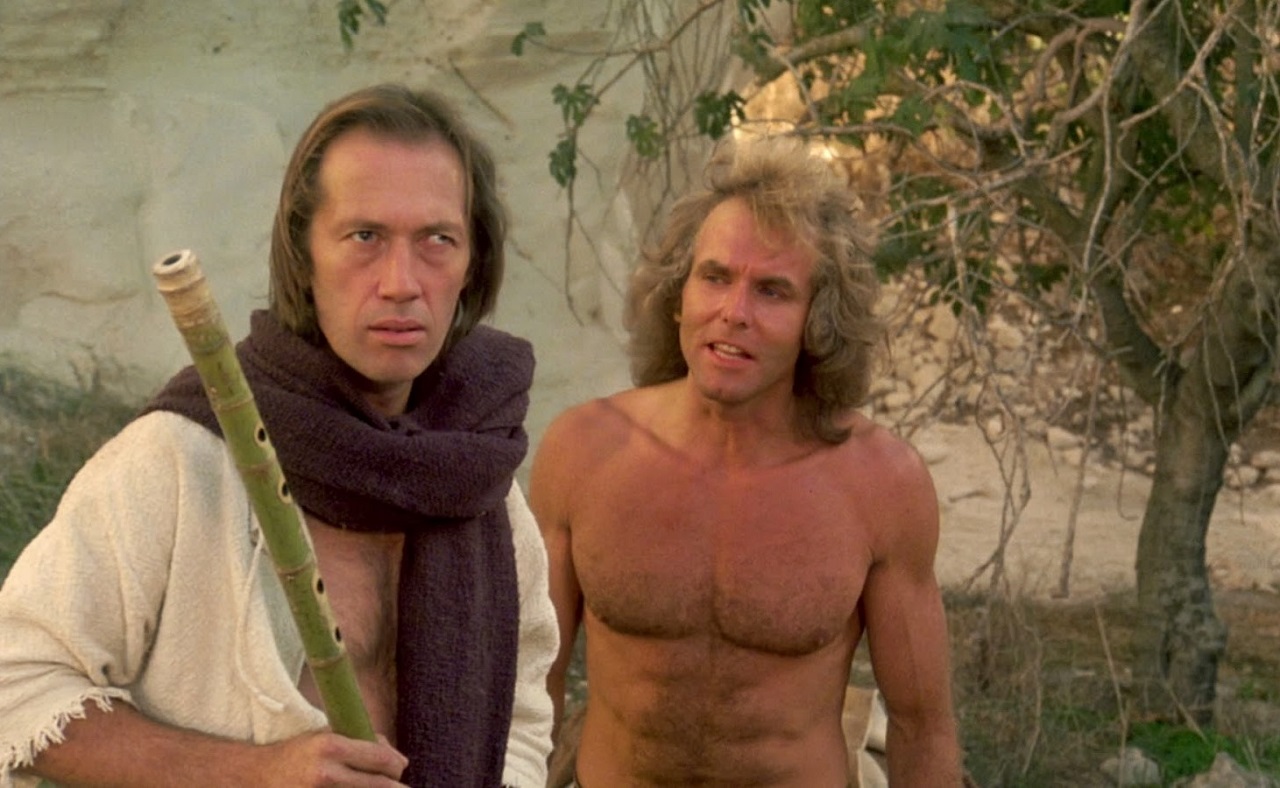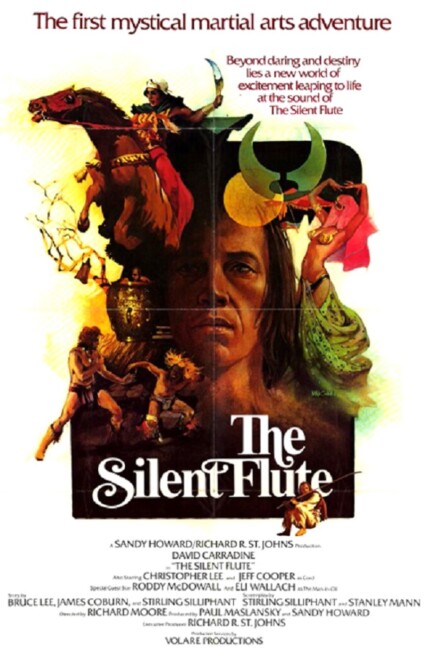aka Circle of Iron
Crew
Director – Richard Moore, Screenplay – Stanley Mann & Stirling Silliphant, Story – Stirling Silliphant, James Coburn & Bruce Lee, Producers – Sandy Howard & Paul Maslansky, Photography – Ronnie Taylor, Music – Bruce Smeaton, Mattes – Ray Caple, Makeup – Tom Smith & Mike Westmore, Production Design – Tambi Larsen. Production Company – Sandy Howard-Richard St Johns
Cast
Jeff Cooper (Cord), David Carradine (The Blind Man/Changsha/Monkey Man/Death), Erica Creer (Tara), Christopher Lee (Zetan), Eli Wallach (The Man in Oil), Anthony de Longis (Morthond), Roddy McDowall (White Robe)
Plot
A contest is held to find a warrior worthy to go on a quest to find the Book of Enlightenment, which purportedly holds all the wisdom in the world. All of the other warriors sent on the quest have so far have failed to return. After being disbarred from the contest, the warrior Cord determines to set out on his own. He passes beyond places no other warrior has been to face a journey filled with many bizarre and puzzling experiences.
The Silent Flute/Circle of Iron is a genuine oddity. It was a pet project of Bruce Lee who concocted it with actor James Coburn and Oscar-winning screenwriter Stirling Silliphant, known for genre films like Village of the Damned (1960), Charly (1968), an Oscar winner for In the Heat of the Night (1967) and a number of Irwin Allen films like The Poseidon Adventure (1972) and The Towering Inferno (1974). Following Bruce Lee’s death in 1975, Stirling Silliphant saw The Silent Flute through to production with David Carradine taking over the role that Lee had intended for himself.
The Silent Flute is a martial arts movie about the Zen philosophy behind the martial arts. (In video stores, it is usually placed in the Martial Arts section with the names of Bruce Lee and David Carradine prominently displayed – unsuspecting punters who pick it up must wonder what on Earth they have ended up with. It would have been even more bizarre if The Silent Flute had been made with Bruce Lee – the thought of 1970s audiences coming to watch this and expecting another Enter the Dragon (1973) is a highly amusing one).
One can see why The Silent Flute was a failure – mindedly, the tv series Kung Fu (1972-5), which David Carradine had come to fame in, was highly successful in espousing the philosophy behind the martial arts. Throughout, in the name of epigrammatic mysticism, one is treated to a parade of bizarre, presumably enlightening, visions. For example, while killing camels with karate chops, David Carradine waxes philosophically about what can be learned from the monkey that tries to bite one’s bottom. And then there is Eli Wallach who turns up as a man who has spent ten years in a barrel of oil trying to dissolve his penis because he has been too cowardly to cut it off.

Dialogue is suitably inscrutable:
“Buddha once sat by a wall and when he arose he was enlightened.”
“Do you compare yourself to Buddha?”
“Only to the wall.”
There are times the film seems barely able to keep its tongue out of its cheek – like the pre-credits quote:
“Tie two birds together, even though they have four wings they cannot fly – The Blind Man.”
“On the other hand: A horse has no udders and a sow can’t whinny and up is down and sideways straight ahead – Cord.”
However, when the book that is supposed to hold all the wisdom in the world is unveiled as only a book of mirrors, the result is so absurd the film collapses into a colossal joke on the audience. No doubt Lee, Stirling Silliphant and James Coburn intended it seriously as a Zen comment on the human condition but to the contrary it seems like a bad joke played on the audience who have sat all the way through out of interest to find what the film construes enlightenment to be. The entire film is absolute tosh, which makes the calibre of some of the names attached to it – David Carradine, Bruce Lee, Christopher Lee, James Coburn, Roddy McDowall – all the more of a surprise.


